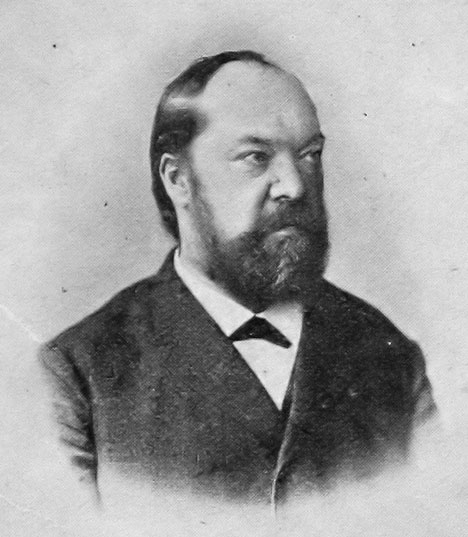<Back to Index>
- Anatomist Regnier de Graaf, 1641
- Author Emily Jane Brontë, 1818
- Member of the Reichstag Eugen Richter, 1838
PAGE SPONSOR

Eugen Richter (Düsseldorf, July 30, 1838 – March 10, 1906) was a German politician and journalist.
Born as the son of a combat medic, Richter attended the Gymnasium in his home town of Düsseldorf. Since 1856, he studied Law and Economics at the Universities of Bonn, Berlin and Heidelberg, that he finished with a law degree in 1859. In those years Richter became a strong advocate of free trade, market economy and Rechtsstaat, views he held for all his life. In 1859, Richter became a civil servant in judiciary. His liberal views caused some trouble with the Prussian bureaucracy several times. Richter achieved renown for his essay Über die Freiheit des Schankgewerbes (On the liberty of the tavern trade). The Magdeburger Spukgeschichte of 1862 brought in a disciplinary procedure. However it was printed in the Niederrheinischen Volkszeitung and in the Magdeburger Zeitung.
In 1864 he was elected the mayor of Neuwied, but the election result was not confirmed by the president of the provincial government. After that, Richter left the civil service and fully entered into parliament and journalism. He became a parliamentary correspondent of the Elberfelder Zeitung to Berlin and established thus also political contacts. In 1867 Richter entered the Reichstag as a member of the Left liberals, and since 1869 he was also a member of the Prussian Lower House. In response to the Anti-Socialist Laws passed in 1878 banning the Social Democrat Party Richter said: "I fear Social Democracy more under this law than without it". Due to fears that Bismarck was going to introduce a tobacco monopoly, Richter unsuccessfully sought to persuade the Reichstag to pass a resolution condemning such a monopoly as "economically, financially, and politically unjustifiable". When Bismarck proposed a system of social insurance paid by the state Richter denounced them as "not Socialistic, but Communistic".
He was the most influential leader of the German Progress Party (Deutsche Fortschrittspartei), since 1884 of the German Freeminded Party (Deutsche Freisinnige Partei), and since 1893 of the Freeminded People's Party (Freisinnige Volkspartei). Beside that he was one of the greatest critics of the policy of Otto von Bismarck as well as the National Liberal Party and the Social Democrats. From 1885 to 1904 he was the chief editor of the liberal newspaper Freisinnige Zeitung.